外研版七年级下册module1模块知识点归纳.docx
外研版英语七年级下册Module1 Lost and found知识点总结

七下(外研版)Module 1 知识点总结一、必背短语welcome back first of all lost and found box a lot of things 欢迎回到首先失物招领箱许多东西be careful with from now on here is/ are let sb do sth 小心对待从现在起这里有让某人做某事get on in a hurry leave sth somewhere that’s why上(车,船等)匆忙地把某物落在某地那是…的原因hundreds of look for at the moment play the piano 成百上千的寻找现在,此刻弹钢琴ride a bike on the board would like to do sth that’s all 骑自行车在布告上想要做某事仅此而已what about you? w hat about/how about doing sth join…club 你呢?做某事怎么样加入俱乐部worry about担心二、必背句子1.Welcome back to school. Come and look in the lost and found box.欢迎回到学校。
首先来看看这个失物招领箱。
2.There are a lot of things in it.里面有许多东西。
3.Whose bag is this?这个袋子是谁的?4.Here is a purple wallet.这里有个紫色的钱包。
5. Please be careful with your things from now on.从现在起请你们小心对待自己的东西。
6. People often lose things when they’re travelling or when they’re in a hurry. 人们在旅游或匆匆忙忙时经常丢东西。
外研社七年级下册Module1语法知识汇总

Module1语法知识要点人称代词形容词性物主代词I MyYou Your 单数She HerHe HisIt ItsWe Our 复数You YourThey Their2 . 主系表结构的否定形式和一般疑问句形式的构成情况(一)否定形式:1. 主语+be (is ,am ,are )not +表语。
例如:She is a good girl. → She is not a good girl.(二)一般疑问句形式:1. Be (Is / Am/ Are )+主语+表语?例如:This girl is in Row One. → Is this girl in Row One?形容词性物主代词与名词性物主代词的用法一.人称代词的主格在句子中作主语1. I am sorry I am late.2. They/We are both from the south.3.She is clever than me.二.人称代词的宾格在句子中作动词宾语或介词宾语,表语。
1His mother told him to study hard.2Deming’s mother bought a new bike for him.3.Who is it ? It is me三.形容词性物主代词一般位于名词前,用作定语。
1 My name is John Green. 我叫约翰·格林。
2Excuse me, is this your car? 对不起,这是您的车吗?3 His parents are in England. 他的父母在英国。
4They wash their faces every day. 他们每天都洗脸。
英语人称代词和物主代词一、人称代词表示“我”、“你”、“他”、“她”、“它”、“我们”、“你们”、“他们”的词,叫人称单数复数主格宾格主格宾格第一人称I me we us 第二人称you you you you第三人称he himthey them she herit it人称代词主格:作主语,表示谁怎么样了、干什么了。
外研版七年级下册Module 1模块知识点总结
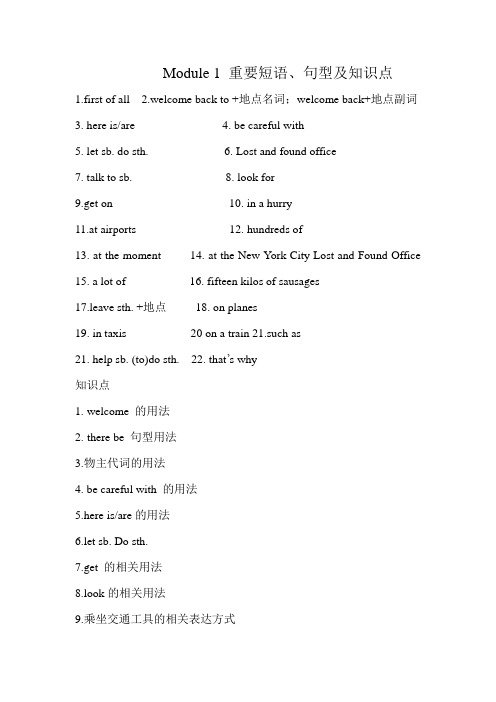
Module 1 重要短语、句型及知识点1.first of all2.welcome back to +地点名词;welcome back+地点副词3. here is/are4. be careful with5. let sb. do sth.6. Lost and found office7. talk to sb. 8. look for9.get on 10. in a hurry11.at airports 12. hundreds of13. at the moment 14. at the New York City Lost and Found Office 15. a lot of 16. fifteen kilos of sausages17.leave sth. +地点18. on planes19. in taxis 20 on a train 21.such as21. help sb. (to)do sth. 22. that’s why知识点1.welcome 的用法2.there be 句型用法3.物主代词的用法4. be careful with 的用法5.here is/are的用法6.let sb. Do sth.7.get 的相关用法8.look的相关用法9.乘坐交通工具的相关表达方式10. leave sth. +地点11.hundred和thousand的用法12. that’s why 的用法重要句型1.Welcome back to school, everyone.2. Whose bag is this?3.Here’s a purple wallet.4. Everyone, please be careful with your things from now on.5. Let me see...6. They leave things on planes, on trains, on buses and in taxis.7.That’s why there are lost and found offices at airports and stations.8.Hundreds of people come here every day.9. We usually have about two thousand mobile phones and one thousand cameras.。
外研社七下Module1 Unit1 ---unit3 知识点汇总

外研社七年级下册M1U1Whose bag is this?知识点精讲知识点一welcome /'welkəm/ int. 欢迎eg:Welcome back! It's nice to see you again.欢迎回来!很高兴又见到你了。
考向一【重点】“welcome to+地点名词”意为“欢迎来到某地”。
但当后接副词here,there,home, back时,介词to要省略。
eg:Hello, welcome home!嗨,欢迎回家!拓展welcome的其他词性及用法:例题Welcome ________ back ________ home.A.to; /B./; toC.to; to D./; /考向二You are welcome意为“不用谢,不客气”,用于回答别人的感谢,另外回答感谢的常用语还有:It's my pleasure. Not at all.知识点二everyone /'evriwʌn/ pron.每个人,人人eg:Is everyone here today? 今天大家都到了吗?考向一【重点】everyone的同义词是everybody,作主语时,谓语动词用单数形式。
eg:Everyone wants to attend the concert.每个人都想参加音乐会。
考向二【易错点】辨析everyone与every one例题1 Water is important to ________,so there are many water festivals around the world. (临沂)A.everyone B.nobodyC.somebody D.something例题二Look! Everyone in the group ________ talking about their dreams.A.is B.areC.have D.has知识点三first of all首先;第一eg:First of all, I think he is a good student.首先,我认为他是一个好学生。
(完整word版)外研版七年级下册Module1知识点讲解与练习,推荐文档
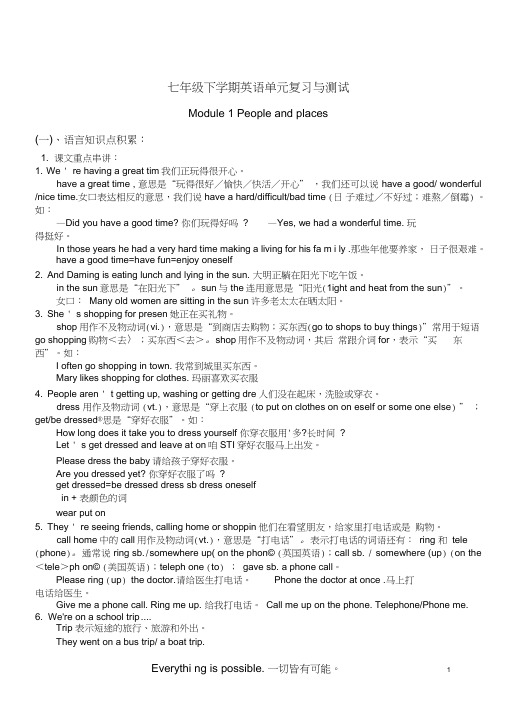
七年级下学期英语单元复习与测试Module 1 People and places(一)、语言知识点积累:1. 课文重点串讲:1. We ' re having a great tim我们正玩得很开心。
have a great time , 意思是“玩得很好/愉快/快活/开心” ,我们还可以说have a good/ wonderful /nice time.女口表达相反的意思,我们说have a hard/difficult/bad time (日子难过/不好过;难熬/倒霉) 。
如:—Did you have a good time? 你们玩得好吗? —Yes, we had a wonderful time. 玩得挺好。
In those years he had a very hard time making a living for his fa m i ly .那些年他要养家,日子很艰难。
have a good time=have fun=enjoy oneself2. And Daming is eating lunch and lying in the sun. 大明正躺在阳光下吃午饭。
in the sun意思是“在阳光下” 。
sun与the连用意思是“阳光(1ight and heat from the sun)”。
女口:Many old women are sitting in the sun许多老太太在晒太阳。
3. She ' s shopping for presen她正在买礼物。
shop用作不及物动词(vi.),意思是“到商店去购物;买东西(go to shops to buy things)”常用于短语go shopping购物<去〉;买东西<去>。
shop用作不及物动词,其后常跟介词for,表示“买东西”。
如:I often go shopping in town. 我常到城里买东西。
七年级下册外研社m1知识点

七年级下册外研社m1知识点一、语法知识点1. 动词be的用法动词be是英语中最基础、最常见的动词之一,其主要用法如下:(1)表示存在,例如:There is a cat in the room.(屋子里有一只猫。
)(2)表示状态,例如:She is tired.(她累了。
)(3)表示身份、职业等,例如:He is a teacher.(他是一名教师。
)2. 一般现在时的构成及用法一般现在时表示经常性或普遍性的动作或状态。
其构成为:主语+动词原形。
例如:She likes swimming.(她喜欢游泳。
)3. 祈使句的构成及用法祈使句是表示请求、命令、建议等意义的句子。
其构成为:动词原形+其他。
祈使句的主语一般省略。
例如:Eat your breakfast.(吃早餐。
)二、词汇知识点1. 蔬菜类单词蔬菜类单词是日常生活中常用的词汇之一,常见的蔬菜有:carrot(胡萝卜)、cucumber(黄瓜)、tomato(西红柿)、lettuce (生菜)等。
例如:I like eating carrots.(我喜欢吃胡萝卜。
)2. 数字类单词数字类单词也是日常生活中常用的词汇之一。
常见的数字有:one(1)、two(2)、three(3)、four(4)等。
例如:I have three apples.(我有三个苹果。
)三、阅读技巧知识点1. 阅读理解阅读理解是英语考试中常见的题型,要求考生在一定时间内阅读短文并回答相关问题。
建议考生在练习时注意以下几点:(1)首先浏览全文,把握大意;(2)遇到不懂的单词可尝试猜测意思;(3)仔细阅读问题,确定问题类型及所需信息;(4)找到对应的句子段落进行答题。
2. 选词填空选词填空是一种练习词汇运用能力的题型。
在做这类题型时,建议考生注意以下几点:(1)认真阅读每个空后的提示及选项;(2)分析每个选项的含义及语法用法;(3)结合整个句子的含义和语法规则进行填空。
以上为七年级下册外研社M1的知识点简介,希望能对同学们的学习有所帮助。
(完整word版)外研版七年级下册 M11 知识点
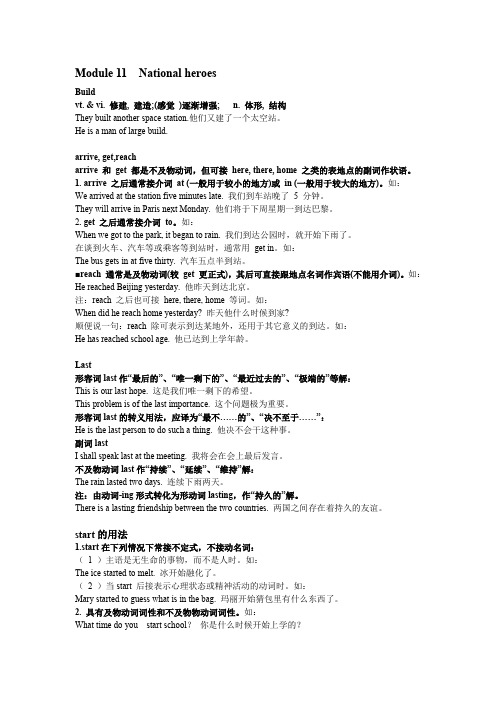
Module 11 National heroesBuildvt. & vi. 修建, 建造;(感觉)逐渐增强; n. 体形, 结构They built another space station.他们又建了一个太空站。
He is a man of large build.arrive, get,reacharrive 和get 都是不及物动词,但可接here, there, home 之类的表地点的副词作状语。
1. arrive 之后通常接介词at (一般用于较小的地方)或in (一般用于较大的地方)。
如:We arrived at the station five minutes late. 我们到车站晚了5 分钟。
They will arrive in Paris next Monday. 他们将于下周星期一到达巴黎。
2. get 之后通常接介词to。
如:When we got to the park, it began to rain. 我们到达公园时,就开始下雨了。
在谈到火车、汽车等或乘客等到站时,通常用get in。
如:The bus gets in at five thirty. 汽车五点半到站。
■reach 通常是及物动词(较get 更正式),其后可直接跟地点名词作宾语(不能用介词)。
如:He reached Beijing yesterday. 他昨天到达北京。
注:reach 之后也可接here, there, home 等词。
如:When did he reach home yesterday? 昨天他什么时候到家?顺便说一句:reach 除可表示到达某地外,还用于其它意义的到达。
如:He has reached school age. 他已达到上学年龄。
Last形容词last作“最后的”、“唯一剩下的”、“最近过去的”、“极端的”等解:This is our last hope. 这是我们唯一剩下的希望。
外研版七年级下Module1知识点
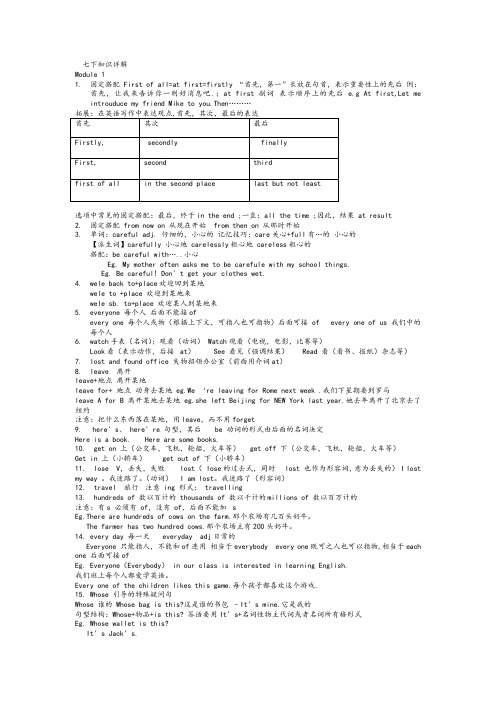
七下知识详解Module 11.固定搭配First of all=at first=firstly “首先,第一”长放在句首,表示重要性上的先后例:首先,让我来告诉你一则好消息吧.;at first副词表示顺序上的先后 e.g At first,Let me introuduce my friend Mike to you.Then………选项中常见的固定搭配:最后,终于in the end ;一直:all the time ;因此,结果 at result2.固定搭配 from now on 从现在开始 from then on 从那时开始3.单词:careful adj. 仔细的,小心的记忆技巧:care关心+full有…的小心的【派生词】carefully 小心地 carelessly粗心地 careless粗心的搭配:be careful with…..小心Eg. My mother often asks me to be carefule with my school things.Eg. Be careful! Don’t get your clothes wet.4.wele back to+place欢迎回到某地wele to +place 欢迎到某地来wele sb. to+place 欢迎某人到某地来5.everyone 每个人后面不能接ofevery one 每个人或物(根据上下文,可指人也可指物)后面可接of every one of us 我们中的每个人6.watch手表(名词);观看(动词) Watch观看(电视,电影,比赛等)Look看(表示动作,后接at) See 看见(强调结果)Read 看(看书、报纸)杂志等)7. lost and found office 失物招领办公室(前面用介词at)8. leave 离开leave+地点离开某地leave for+ 地点动身去某地 eg.We ‘re leaving for Rome next week .我们下星期要到罗马leave A for B 离开某地去某地 eg.she left Beijing for NEW York last year.她去年离开了北京去了纽约注意:把什么东西落在某地,用leave,而不用forget9. here’s、 here’re 句型,其后be 动词的形式由后面的名词决定Here is a book. Here are some books.10. get on 上(公交车,飞机,轮船,火车等)get off 下(公交车,飞机,轮船,火车等)Get in 上(小轿车)get out of 下(小轿车)11. lose V,丢失,失败lost( lose的过去式,同时lost 也作为形容词,意为丢失的) I lost my way 。
外研版七年级下册Module 1知识点整理
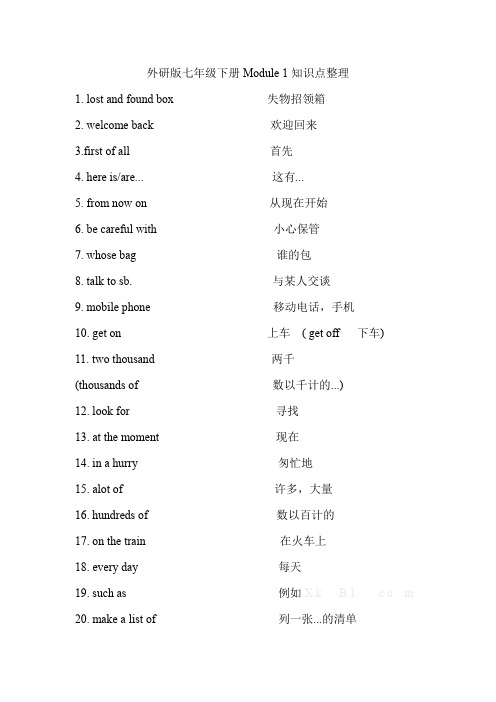
外研版七年级下册Module 1知识点整理1. lost and found box 失物招领箱2. welcome back 欢迎回来3.first of all 首先4. here is/are... 这有...5. from now on 从现在开始6. be careful with 小心保管7. whose bag 谁的包8. talk to sb. 与某人交谈9. mobile phone 移动电话,手机10. get on 上车( get off 下车)11. two thousand 两千(thousands of 数以千计的...)12. look for 寻找13. at the moment 现在14. in a hurry 匆忙地15. alot of 许多,大量16. hundreds of 数以百计的17. on the train 在火车上18. every day 每天19. such as 例如X k B 1 . c o m20. make a list of 列一张...的清单21. ask/answer questions 问/回答问题重点句子:1.Welcome back to school! 欢迎回到学校。
2.Whose bag is this? 这是谁的书包?3.It’s mine. 它是我的。
4.Are these crayons yours? 这些是你的蜡笔吗?5. Whose tapes are these? 这些是谁的磁带?6. Here’s a purple wallet! 这儿有个紫色钱包。
7. I think it’s Betty’s. Lingling. 我认为它是玲玲的。
8. Everyone, please be careful with your things from now on.请大家从今以后仔细对待你们的东西。
9. People often lose things when they’re travelling or when they’re in a hurry.当人们旅行或在匆忙中时,他们经常丢东西。
新外研版七年级下册知识点整理1
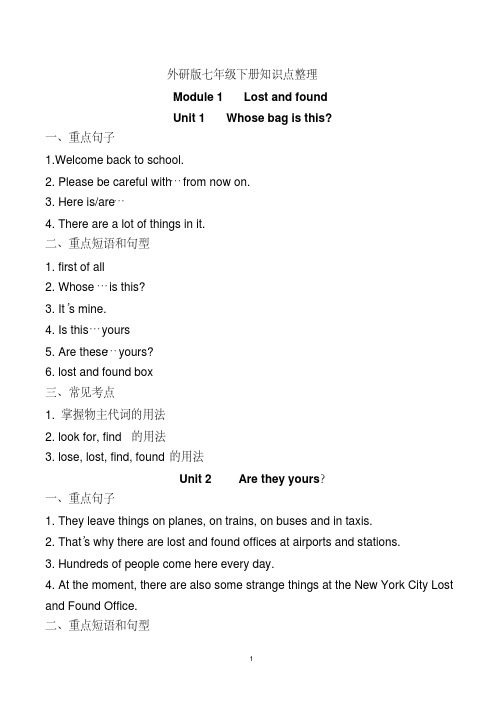
外研版七年级下册知识点整理Module 1 Lost and foundUnit 1 Whose bag is this?一、重点句子1.Welcome back to school.2. Please be careful with…from now on.3. Here is/are…4. There are a lot of things in it.二、重点短语和句型1. first of all2. Whose …is this?3. It’s mine.4. Is this…yours5. Are these…yours?6. lost and found box三、常见考点1. 掌握物主代词的用法2. look for, find 的用法3. lose, lost, find, found的用法Unit 2 Are they yours?一、重点句子1. They leave things on planes, on trains, on buses and in taxis.2. That’s why there are lost and found offices at airports and stations.3. Hundreds of people come here every day.4. At the moment, there are also some strange things at the New York City Lost and Found Office.二、重点短语和句型1. They are looking for…2. Whose are they?3. in a hurry4. fifteen kilos of sausages5. talk to sb6. get on the bus三、常见考点1. two hundred,hundreds of2. leave, forget四、本模块语法1. 名词性物主代词的用法2. 形容词性物主代词的用法3. 人称代词的用法Module 2 What can you do?Unit 1 I can play the piano.一、重点句子1. What about you?2. That’s all.3. Don’t worry about…4. Choose your favourite club.二、重点短语和句型1. Can you…?2. Yes, I can. / No, I can’t.3. Which club can…?4. I can’t…5. on the board6. ride a bike7. speak Chinese8. like cooking三、常见考点(不用解析)1. play table tennis和play the piano的用法2. teach sb sth宾格的用法3. can 的用法4. would like to doUnit 2 I can run really fast.一、重点句子1. I get on well with everyone, classmates and teachers.2. I’m always ready to help others.3. I do well at school.4. I’m sure everybody would like a clean classroom, just like home.二、重点短语和句型1. I’ like to be …2. I want to be…3. class/ PE/ cleaning monitor4. promise to do5. run fast6. be good at7. get the best score8. just like9. do cleaning三、常见考点1. be good at, do well in2. help sb do/to do/with sth3. get on well with4. make our classroom beautiful,make的用法四、本模块语法1. can 的用法Module 3 (有具体内容)Unit 1 (有具体内容)一、重点句子2. On Saturday morning, I’m going to check my email and do my homework.在周六上午,我打算查收一下我的电子邮件并做作业。
外研社七年级英语下册 MODULE 1 重要短语归纳整理
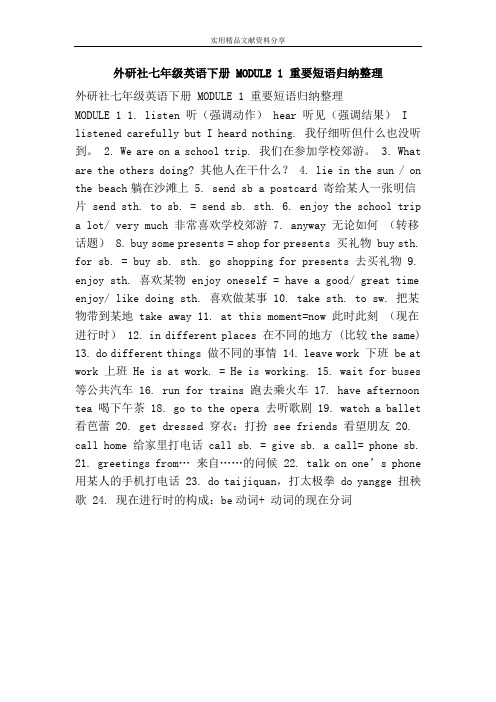
实用精品文献资料分享外研社七年级英语下册 MODULE 1 重要短语归纳整理外研社七年级英语下册 MODULE 1 重要短语归纳整理MODULE 1 1. listen 听(强调动作) hear 听见(强调结果) I listened carefully but I heard nothing. 我仔细听但什么也没听到。
2. We are on a school trip. 我们在参加学校郊游。
3. What are the others doing? 其他人在干什么? 4. lie in the sun / on the beach躺在沙滩上 5. send sb a postcard 寄给某人一张明信片 send sth. to sb. = send sb. sth. 6. enjoy the school trip a lot/ very much 非常喜欢学校郊游 7. anyway 无论如何(转移话题) 8. buy some presents = shop for presents 买礼物 buy sth. for sb. = buy sb. sth. go shopping for presents 去买礼物 9. enjoy sth. 喜欢某物 enjoy oneself = have a good/ great time enjoy/ like doing sth. 喜欢做某事 10. take sth. to sw. 把某物带到某地 take away 11. at this moment=now 此时此刻(现在进行时) 12. in different places 在不同的地方 (比较the same) 13. do different things 做不同的事情 14. leave work 下班 be at work 上班 He is at work. = He is working. 15. wait for buses 等公共汽车 16. run for trains 跑去乘火车 17. have afternoon tea 喝下午茶 18. go to the opera 去听歌剧 19. watch a ballet 看芭蕾 20. get dressed 穿衣;打扮 see friends 看望朋友 20. call home 给家里打电话 call sb. = give sb. a call= phone sb.21. greetings from… 来自……的问候22. talk on one’s phone 用某人的手机打电话 23. do taijiquan,打太极拳 do yangge 扭秧歌 24. 现在进行时的构成:be动词+ 动词的现在分词。
外研版七年级下册英语第1模块知识点
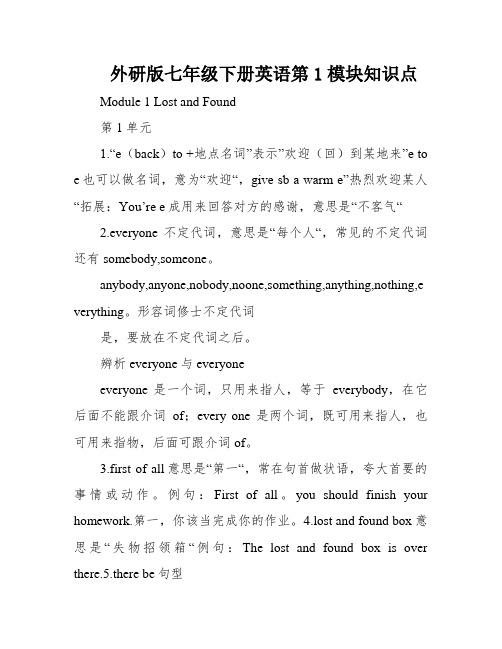
外研版七年级下册英语第1模块知识点Module 1 Lost and Found第1单元1.“e(back)to +地点名词”表示”欢迎(回)到某地来”e to e也可以做名词,意为“欢迎“,give sb a warm e”热烈欢迎某人“拓展:You’re e成用来回答对方的感谢,意思是“不客气“2.everyone不定代词,意思是“每个人“,常见的不定代词还有somebody,someone。
anybody,anyone,nobody,noone,something,anything,nothing,e verything。
形容词修士不定代词是,要放在不定代词之后。
辨析everyone与everyoneeveryone是一个词,只用来指人,等于everybody,在它后面不能跟介词of;every one是两个词,既可用来指人,也可用来指物,后面可跟介词of。
3.first of all意思是“第一“,常在句首做状语,夸大首要的事情或动作。
例句:First of all。
you should finish your homework.第一,你该当完成你的作业。
4.lost and found box意思是“失物招领箱“例句:The lost and found box is over there.5.there be句型①如果there be后为可数名词单数或不可数名词,be用is;若为可数名词复数,be用are.②如果there be后的主语包含两者或两者以上,be的形式适用就近原则,即be与离他最近的主语在数上保持一致。
③辨析there be与haveThere beHave存在拥有主语是人或物,位于be动词之后主语平日是人,位于have之前6.辨析a lot of /lots of。
与lots ofA lot of/lots of“许多”既可修士可数名词,又可修饰不可数名词Therearealotof/lotsofchildren in the park。
外研版英语七年级下册Module1 知识点清单-word文档资料
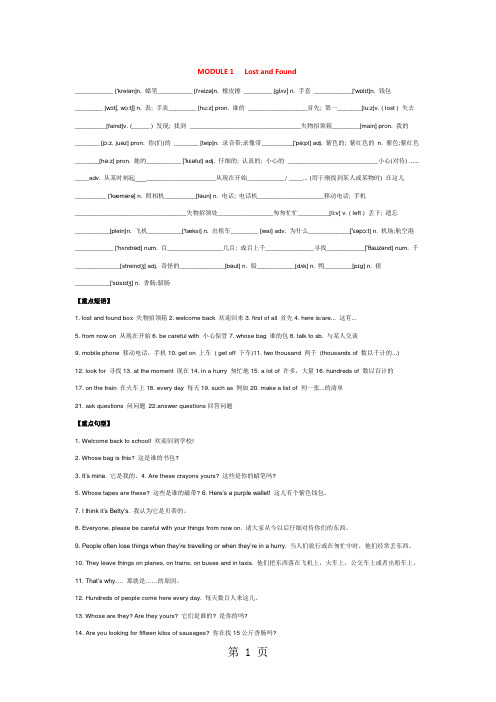
MODULE 1 Lost and Found___________ ['kreiən]n. 蜡笔__________ [i'reizə]n. 橡皮擦________ [ɡlʌv] n. 手套___________['wɒlɪt]n. 钱包________ [wɔtʃ, wɔ:tʃ] n. 表; 手表________ [hu:z] pron. 谁的_________________首先; 第一_______[lu:z]v. ( lost ) 失去_________[faind]v. (_____ ) 发现; 找到________________________________失物招领箱________[main] pron. 我的_______ [jɔ:z, juəz] pron. 你(们)的_______ [teip]n. 录音带;录像带_________['pə:pl] adj. 紫色的; 紫红色的n. 紫色;紫红色_______[hə:z] pron. 她的__________ ['kεəful] adj. 仔细的; 认真的; 小心的__________________________小心(对待) ...... ____adv. 从某时刻起_______________________从现在开始___________/ ____... (用于刚找到某人或某物时) 在这儿_________ ['kæmərə] n. 照相机_________[fəun] n. 电话; 电话机___________________移动电话; 手机________________________________失物招领处________________匆匆忙忙_________[li:v] v. ( left ) 丢下; 遗忘__________[plein]n. 飞机__________['tæksi] n. 出租车________ [wai] adv. 为什么____________['εəpɔ:t] n. 机场;航空港___________ ['hʌndrəd] num. 百________________几百; 成百上千______________寻找___________['θauzənd] num. 千_____________[streindʒ] adj. 奇怪的_____________[bəut] n. 船___________[dʌk] n. 鸭________[pɪg] n. 猪__________['sɒsɪdʒ] n. 香肠;腊肠【重点短语】1. lost and found box 失物招领箱2. welcome back 欢迎回来3. first of all 首先4. here is/are... 这有...5. from now on 从现在开始6. be careful with 小心保管7. whose bag 谁的包8. talk to sb. 与某人交谈9. mobile phone 移动电话,手机10. get on 上车( get off 下车)11. two thousand 两千(thousands of 数以千计的...)12. look for 寻找13. at the moment 现在14. in a hurry 匆忙地15. a lot of 许多,大量16. hundreds of 数以百计的17. on the train 在火车上18. every day 每天19. such as 例如20. make a list of 列一张...的清单21. ask questions 问问题22.answer questions回答问题【重点句型】1. Welcome back to school! 欢迎回到学校!2. Whose bag is this? 这是谁的书包?3. It’s mine. 它是我的。
外研版七年级下册英语第一模块《M1.Lostandfound》重要知识点总结
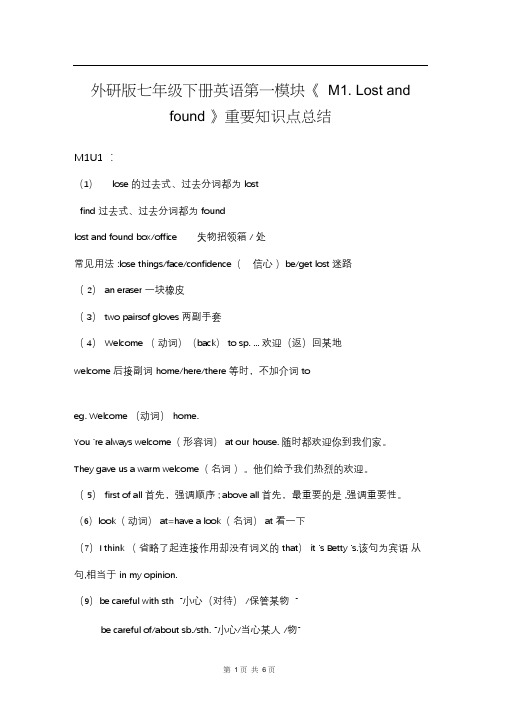
外研版七年级下册英语第一模块《M1. Lost andfound 》重要知识点总结M1U1 :(1)lose 的过去式、过去分词都为lostfind 过去式、过去分词都为foundlost and found box/office 失物招领箱/ 处常见用法:lose things/face/confidence(信心)be/get lost 迷路(2)an eraser 一块橡皮(3)two pairsof gloves 两副手套(4)Welcome (动词)(back) to sp. ... 欢迎(返)回某地welcome 后接副词home/here/there 等时,不加介词toeg. Welcome (动词)home.You 're always welcome(形容词) at our house. 随时都欢迎你到我们家。
They gave us a warm welcome(名词)。
他们给予我们热烈的欢迎。
(5)first of all 首先,强调顺序; above all 首先,最重要的是,强调重要性。
(6)look(动词) at=have a look(名词) at 看一下(7)I think (省略了起连接作用却没有词义的that) it 's Betty 's.该句为宾语从句,相当于in my opinion.(9)be careful with sth “小心(对待)/保管某物”be careful of/about sb./sth. “小心/当心某人/物”be careful (not) to do sth. “小心(不)做某事”(10)from now/then/1982 on 从现在/那时/1982 年开始(9)Here be(is/are)... “...... 在这”,be 动词遵循语法的“就近原则” ,同there be 句型。
eg.S1.Here isan eraser. S2.Here aretwo purple wallets.M1U2 :(1)at the lost and found office 在失物招领处(2)look for 有目的地寻找,强调动作&find 强调结果,意为“找到” 。
- 1、下载文档前请自行甄别文档内容的完整性,平台不提供额外的编辑、内容补充、找答案等附加服务。
- 2、"仅部分预览"的文档,不可在线预览部分如存在完整性等问题,可反馈申请退款(可完整预览的文档不适用该条件!)。
- 3、如文档侵犯您的权益,请联系客服反馈,我们会尽快为您处理(人工客服工作时间:9:00-18:30)。
外研版七年级下册module 1模块知识点归纳教学内容《一〉短语学习I.lie in the sun / on the beach 躺在太阳下.沙滩上2.s end sb a postcard 寄给某人一张明信片send sth. to sb. = send sb. sth. 3・ enjoy the school trip a lot/ very much 非常喜欢学校郊游4.anyway无论如何《转移话题》5.buy some presents = shop for presents 买木l•物buy sth. for sb. = buy sb. sth.go shopping for presents 去买木L•物6.take sth. to sw.把某物带到某地take away拿开7.at this moment=now 此时此刻(现在进行时〉& in different places 在不同的地方(比较the same)9.do different things 做不同的事情10.leave work 下班be at work 上班He is at work. = He is working ・II.wait for buses等公共汽车12.run for trains跑去乘火车13.have afternoon tea 喝下午茶14.go to the opera 去听歌剧15.watch a ballet 看芭蕾16.get dressed 穿衣;打扮17.see friends 看望朋友18.call home 给家里打电话call sb. = give sb. a call= phone sb・19.greetings from… 来自..... 的问候20.talk on ones phone用某人的手机打电话21.do taijiquan,打太极拳do yangge 扭秧歌(二〉单词解析(l)listen听(强调动作》,是不及物动词,常与to连用,表示有意识的听。
hear听见《强调结果)hear of/about听说hear from收到・・•的来信hear sb do sth ........ 听到某人做了某事,事情已经结束hear sb doing sth…听到某人正在做某事,事情正在发生例句:I listened carefully but I heard nothing.我仔细听但什么也没听到。
同步巩固:( )1—Hi, mum.Can you ______ me?—Yes,I can.A.listenB.listen toC.hearD.hear of()2. _________ me,please.A.listenB.listen toC.hearD.hear of( )3.1 often hear him _______ this songs・A.singB.singingC.singsD.to sing(2)say,speak,talk,tell 的用法say意为“讲”,强调说话的内容。
say to sb对某人说;say to oneself自言自语speak意为“讲”,强调动作的本身。
speak to sb和某人通话.交谈talk(v) “谈话,说话”,强调动作本身,表示与别人交谈。
talk with/to sb和某人交谈talk about sth谈论某事(n) have a talk 听报告give a talk 做报告tell告诉,讲诉,指用话语或文字来告诉某人某事。
tell sb (not)to do sth告诉某人《不〉做某事tell sb about sth告诉某人关于某事tell a lie 说谎tell a story to sb给某人讲故事同步练习:1.She can ___ a little French・A.speakB.sayC.tellD.talk2.This is Mr Green _____ ・A.speakingB. sayingC.tellingD.talking3.May I _______ to Mr Wang?A. speakB.sayC.tellD.talk4.He ____ t o me,“ Don't read in bed. ”A.speakB.saysC.tellsD.talk5.He ____ t hat he will stay at home・A.speaksB.saysC.tellsD.talks6.—What are they doing?—They are talking ____ the picture・A.toB.aboutC.withD.at7.—What's she doing?—She's ____ with her friend・A.speakingB. sayingC.tellingD.talking8.The teachers us not to look out of the window.A.speakB.sayC.tellD.talk(3)one...the other两者中的一个…另一个;one...another三者或三者以上的一个.••另一个;some... others —些・・・另一些l.other可作形容词或代词,做形容词时,意思是“别的,其他”,泛指“其他的《人或物〉”。
如:Do you have any other question(s)?你还有其他问题吗?;Ask some other people.问问别人吧!Put it in your other hand.把它放在你另一只手里。
2.the other指两个人或物中的一个时,只能用the other,不能用another,此时的other作代词。
如:He has two daughters. One is a nurse, the other is a worker.他有两个女儿,一个是护士,另一个是工人。
the other后可加单数名词,也可加复数名词(泛指其他的〉,此时的othei•作形容词。
如:On the other side of the street, there is a tall tree.在街道的另一边,有一棵大树。
Mary is much taller than the other girls.玛丽比其他的女孩高得多。
He lives on the other side of the river.他住在河的对岸。
3.others是other的复数形式,泛指“另外几个”,“其余的”。
在句中可作主语、宾语。
如:Some of us like singing and dancing, others go in for sports.我们一些人喜欢唱歌和跳舞,其余的从事体育活动。
Give me some others, please.请给我别的东西吧!There are no others・没有别的了。
4.the others意思是“其他东西,其余的人”。
特指某一范围内的“其他的(人或物》是the other的复数形式。
如:Two boys will go to the zoo, and the others will stay at home.两个男孩将去动物园,其余的留在家里。
the others=the other + 复数名词,5.another=an+ other,既可作形容词,也可作代词,只能用于三个或更多的人或物,泛指同类事物中的三者或三者以上的“另一个”,只能代替或修饰单数可数名词。
如:I don' t like this one. Please show me another.我不喜欢这一个,请给我看看另一个。
I have three daughters・ One is a nurse, another is a teacher and another is a worker.我有三个女儿。
一个是护士,另一个是教师,还有一个是工人。
1.1have two pencils・ One is red and ___ is blue・A.the otherB.otherC.othersD.the others2.There are two books. One is yours, ______ is mine.A.the otherB.otherC.othersD.the others3.1have three books here・ One is on the desk, ____ are in the bag・A.the otherB.otherC.othersD.the others4. Would you like ____ cake?Yes,please.A.anotherB.otherC.othersD.the othersenjoy sth.喜欢某物enjoy oneself = have a good/ great time 过得开心。
enjoy/ like doing sth.喜欢做某事表达美好祝愿的句子:Have fun!玩得高兴。
Have a good time!祝你开心。
Have a nice time!祝你愉快。
Enjoy yourself!玩得开心。
Have a good trip!旅途愉快。
练习巩固:1 • I'm going to start off on a trip to the seaside.A. Have a wonderful time!B. Its nice of you.C.Thats right ・D.Yes,go ahead ・2. My father will take me to Dalian.B. Glad to hear thatD.Well done.(4) dress, wear, put on ,have ・・・on 的区另Udress 表示“穿衣服,给・・•穿衣服”,表示穿的动作,做及物动词时, 宾语是人。
get dressed 穿衣服 dress up 乔装,打扮dress oneself 给自己穿衣服dress sb 给某人穿衣服 wear "穿,戴”,表示穿,戴的状态,后面接穿戴之物。
put on 表示穿戴的状态,后面直接加穿戴之物。
have ...on 表示穿戴的状态,不用在现在进行时。
1. Please ____ your clothes .It's very cold outside ・A.put onB.wearC.dressD.have on2. Her mother _____ her in the bed.A.put onB.puts onC.dressD.dresses3. Get up and _____ quickly.A.put onB.wearC.dressD.have on4. She is _______ a beautiful hat on.A.hasB.haveC.is havingD.is hasing5. The little boy can ________ ・A.get dressedB.gets dressedC.dressesD.got dressed6. My baby is too young to dress _______ LA.himB.himselfC.heD.his7. Please ______ y our raincoat. It*s raining heavily.A.Have fun! C.Good luck.(5)・begin , start 开始可作及物动词也可作不及物动词Start 动身,启程”,用作“开始”讲时,多指具体行动,特别是在机械物质方面,常表示“开动,发动”。
